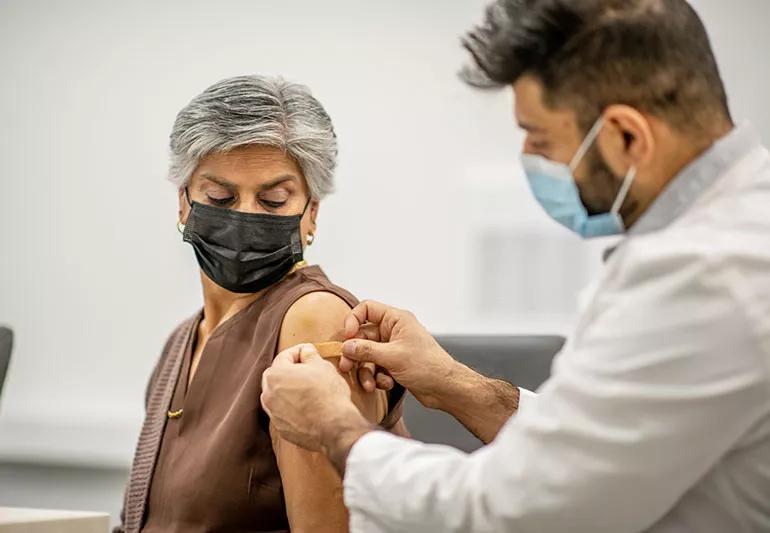Find out who needs protection the most

Every year, your doctor likely reminds you of the benefits of getting a flu shot. But there’s another vaccine you might discuss with your doctor, too — one that helps protect you from pneumonia.
Advertisement
Cleveland Clinic is a non-profit academic medical center. Advertising on our site helps support our mission. We do not endorse non-Cleveland Clinic products or services. Policy
While not a seasonal vaccine or as widely prescribed as the flu shot, the pneumococcal vaccine helps protect those most at risk for serious pneumococcal infections that can lead to complications, a hospital stay or even death.
“And in the age of COVID-19, it’s especially important to focus on the health and safety of your lungs,” says pulmonologist Anu Suri, MD, FCCP. For those who have preexisting conditions, even more so.
Pneumonia is an infection in one or both lungs that typically stems from several kinds of germs, most often bacteria and viruses.
Symptoms can develop gradually or suddenly, including:
Early detection is often challenging because many people with these symptoms assume they have a cold or the flu.
It’s important to also note that the vaccine helps protect against some — but not all — bacterial pneumonia.
“There are dozens of different types of bacterial pneumonia,” says Dr. Suri. “The vaccine will certainly reduce your risk of the most common bacterial pneumonia.”
The Centers for Disease Control and Prevention (CDC) recommends the pneumococcal vaccine for those who fall into the following groups:
Advertisement
The recommendations are sometimes confusing, so it’s a good idea to talk to your healthcare provider about your questions and concerns, Dr. Suri says.
And don’t wait to have that conversation. “This is an infection you see year-round,” she adds.
Again, it’s best to determine this with your doctor, but as a general rule, the CDC states you should not get the pneumococcal vaccine if:
There are currently two vaccines administered in the United States:
Getting a pneumococcal vaccine will not cause you to come down with the flu, pneumonia or other virus, or experience long-term side effects, according to Dr. Suri.
Not only will the pneumococcal vaccine help reduce the risk of contracting certain types of bacterial pneumonia, but it also guards against serious consequences resulting from the flu and severe infections, like sepsis.
Dr. Suri encourages you to discuss this vaccine with your healthcare provider if you have young children, or if you smoke, are over 65 or have other risk factors.
Advertisement
Learn more about our editorial process.
Advertisement

Walking pneumonia is milder and doesn’t always require medication — but it’s also highly contagious

Diaphragmatic breathing, pursed lip breathing and huff coughing can help manage COPD symptoms, like chest congestion and shortness of breath

All states require DTaP, MMR, polio and chickenpox vaccines — healthcare providers recommend others, too

Adult-onset asthma has the same symptoms as childhood asthma, but tends to be more severe

An asthma action plan is a personalized, step-by-step set of instructions for handling asthma attacks

Rolling up your sleeve in September or October is ideal — but it’s never too late to get your flu shot

There’s no safe way to find, handle, repair or remove asbestos yourself — it’s always a job for a professional

Tetanus is easy to prevent but tough to treat — vaccines are your best defense

The best parenting style balances enforcing rules and showing plenty of love

Tips include cutting back on sugar, focusing on exercise and managing stress

It can be harder to let go when you’ve invested time, energy and emotions — but it might be the healthier choice long term